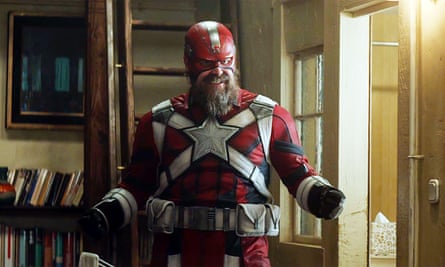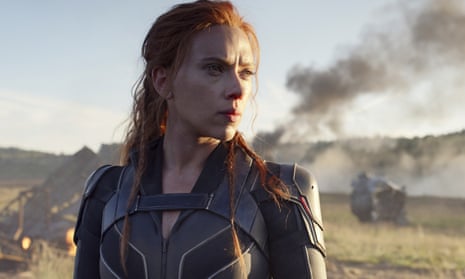The sensuous cough-syrup purr of Scarlett Johansson’s voice is something I’ve missed in lockdown; now it’s back with a throaty vengeance in the highly enjoyable standalone episode for which her character Black Widow was well overdue. It is co-written by WandaVision creator Jac Schaeffer and directed with gusto by Cate Shortland, with touches of Terminator 2 and Mission: Impossible but undoubtedly keeping the tonal consistency of a typical MCU melodrama.
This movie gives us the backstory to Black Widow’s presence in the Marvel Cinematic Universe, involving an origin-myth tale of family trauma, identity crisis and sibling rivalry with a pugnacious kid sister, Yelena, entertainingly played by Florence Pugh. Yelena can’t help mocking – but also maybe envying – Black Widow’s balletic fight stance which involves absurd posing and resembles the mane-tossing antics of a woman in a shampoo advert.
Black Widow, or Natasha, is now cut off from her Avenger family and this seems like the right time to acquaint us with her unhappy upbringing as part of a Russian sleeper cell, posing as a regular American family in Ohio in the far-off 1990s. (Cue: a doomy cover of Nirvana’s Smells Like Teen Spirit on the soundtrack.) The girls turn out to be orphans whose parents have perhaps been made away with; now their fake mom is Melinda (Rachel Weisz) and their fake dad is beefy and conceited Alexei, a rumbustious and scene-stealer of a comic turn from David Harbour, both possessed of utterly convincing American accents and fond of crooning along to American Pie to the car tape-deck as they sentimentally glimpse a baseball game.
Alexei is proud of being the first Soviet-sponsored super soldier, named “Red Guardian” with a knockoff superhero outfit, and rather tragically obsessed with someone he thinks of as his opposite number, Captain America, in what he quaintly describes as the “geopolitical stage of international conflict”. Now his masters have suppressed the truth about his superheroism and abandoned him in a mouldering prison where he passes the time challenging fellow cons to arm-wrestling contests.

The family’s life in the American heartland is to end in catastrophe and in the present they must come to a reckoning with the evil puppetmaster Dreykov (Ray Winstone) who has been training an emotional zomboid army of “widows” of which the two girls were originally a part. He controls their minds but also keeps a stash of glowing-red antidote phials, which could restore these young women’s independence, and these of course assume a MacGuffiny importance – so much so that we have to wonder at the wisdom in creating the phials in the first place. Incidentally, Dreykov seems to have a very particular political connection in that decade: there’s a picture of him with Bill Clinton, which seems a bit rough on that president; surely a villain as canny as Dreykov would have cultivated links with the Bush family as well?
Well, Natasha and Yelena must take on Dreykov, who has good reason to hate Natasha with particular passion – an aspect to Black Widow’s personality which is not in fact fleshed out as convincingly as it might be – but first they have to sort out their own differences, and there are impressive bone-crunching close-quarter martial-arts fight scenes between the pair of them.
Somehow, the most teasingly potent relationship revealed here is that electra complex, the bond between Black Widow and her preposterous old dad, who is very large, very given to fits of temper and likes smashing things. Does this, perhaps, give us a Freudian clue to Black Widow’s tendresse for Dr Bruce Banner, the alter ego of Hulk? This glimpse into her troubled psyche is worth the price of admission on its own.
For fans of Black Widow and everyone else, this episode is great fun and Harbour could well ascend to spinoff greatness of his own.

Comments (…)
Sign in or create your Guardian account to join the discussion